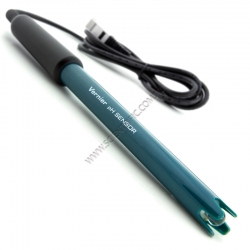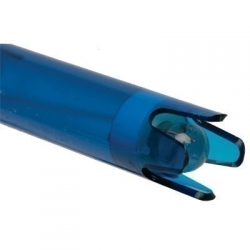
Vernier pH sensor
Enlarge

Close up of pH sensor tip
Enlarge

Vernier pH sensor
Enlarge

Close up of pH sensor tip
Enlarge
Vernier pH Sensor
Order code: PH-BTA
VERNIER PH SENSOR
Vernier's general purpose pH sensor can be used across disciplines including chemistry, biology, middle school science and environmental science.
Use the pH Sensor just as you would a traditional pH meter with the additional advantages of automated data collection, graphing and data analysis.
Typical activities using the Vernier pH sensor include:
• Acid-base titrations
• Studies of household acids and bases
• Monitoring pH change during chemical reactions or in an aquarium as a result of photosynthesis
• Investigations of acid rain and buffering
• Analysis of water quality in streams and lakes
Requirements:
This sensor requires suitable software and an interface such as one of the Vernier LabQuest variations or Vernier Go-Link.
For comprehensive details of the possible sensor/interface/software combinations see the Compatibility Guide link below.
FPH-BTA Vernier Tris-Compatible Flat pH Sensor is more suitable for studying Tris buffers or semi-solids such as a soil slurry.
Specifications:
• Type: Sealed, gel-filled, epoxy body, Ag/AgCl
• Shaft Diameter: 12mm OD
• Response time: 90% of final reading in 1 second
• Temperature range: 5 to 80°C
• Range: pH 0–14
• Accuracy: +/- 0.2pH units
• Isopotential pH: pH 7 (point at which temperature has no effect)
Included:
• Vernier pH sensor
• pH storage solution
• pH storage solution bottle
• User manual
NOTE: Warranty does not cover accidental breakage of the glass bulb in the sensor
| User Manual | Vernier pH Sensor | ||
Educational use only:
Vernier and Kidwind products are designed for educational use. They are not appropriate for industrial, medical or commercial applications. Details
Warranty
- Warranty: 5 years (no warranty on bulb)
Dimensions- Package size (HxWxD): 64x64x279mm
- Packed weight: 180g
Last edited 9th Jan 2025
 This product is used in teaching these Australian Curriculum codes:
This product is used in teaching these Australian Curriculum codes:
ACSSU187 - Chemical Sciences - Chemical Reactions - Different types of chemical reactions are used to produce a range of products and can occur at different rates
ACSBL019 - Biodiversity and the interconnectedness of life - Describing biodiversity - Ecosystems are diverse, composed of varied habitats and can be described in terms of their component species, species interactions and the abiotic factors that make up the environment
ACSBL021 - Biodiversity and the interconnectedness of life - Describing biodiversity - In addition to biotic factors, abiotic factors including climate and substrate can be used to and classify environments
ACSBL029 - Biodiversity and the interconnectedness of life - Ecosystem dynamics - Models of ecosystem interactions (for example, food webs, successional models) can be used to predict the impact of change and are based on interpretation of and extrapolation from sample data (for example, data derived from ecosystem surveying techniques
ACSCH063 - Molecular interactions and reactions - Aqueous solutions and acidity - The concentration of a solution is defined as the amount of solute divided by the amount of solution; this can be represented in a variety of ways including by the number of moles of the solute per litre of solution (mol L1) and the mass of the solute pe
ACSCH066 - Molecular interactions and reactions - Aqueous solutions and acidity - The pH scale is used to compare the levels of acidity or alkalinity of aqueous solutions; the pH is dependent on the concentration of hydrogen ions in the solution
ACSCH064 - Molecular interactions and reactions - Aqueous solutions and acidity - The presence of specific ions in solutions can be identified using analytical techniques based on chemical reactions, including precipitation and acidbase reactions
ACSCH097 - Equilibrium acids and redox reactions - Chemical equilibrium systems - Acids are substances that can act as proton (hydrogen ion) donors and can be classified as monoprotic or polyprotic depending on the number of protons donated by each molecule of the acid
ACSCH101 - Equilibrium acids and redox reactions - Chemical equilibrium systems - Acidbase indicators are weak acids or bases where the acidic form is of a different colour to the basic form
ACSCH096 - Equilibrium acids and redox reactions - Chemical equilibrium systems - Equilibrium position can be predicted qualitatively using equilibrium constants
ACSCH091 - Equilibrium acids and redox reactions - Chemical equilibrium systems - Over time, physical changes and reversible chemical reactions reach a state of dynamic equilibrium in a closed system, with the relative concentrations of products and reactants defining the position of equilibrium
ACSCH100 - Equilibrium acids and redox reactions - Chemical equilibrium systems - The pH scale is a logarithmic scale and the pH of a solution can be calculated from the concentration of hydrogen ions; Kw can be used to calculate the concentration of hydrogen ions from the concentration of hydroxide ions in a solution
ACSCH098 - Equilibrium acids and redox reactions - Chemical equilibrium systems - The strength of acids is explained by the degree of ionisation at equilibrium in aqueous solution, which can be represented with chemical equations and equilibrium constants (Ka)
ACSCH102 - Equilibrium acids and redox reactions - Chemical equilibrium systems - Volumetric analysis methods involving acidbase reactions rely on the identification of an equivalence point by measuring the associated change in pH, using chemical indicators or pH meters, to reveal an observable end point
ACSSU176 - Biological Sciences - Ecology - Ecosystems consist of communities of interdependent organisms and abiotic components of the environment; matter and energy flow through these systems
ACSSU179 - Chemical Sciences - Chemical Reactions - Chemical reactions, including combustion and the reactions of acids, are important in both non-living and living systems and involve energy transfer
Click a curriculum code to see other products that relate.
| Accessories / Spare Parts: | From |
| MSTIR - Vernier Microstirrer | $22.00 |
| ESUP - Vernier Electrode Support | $25.00 |
| WDS - Vernier Water Depth Sampler | $296.00 |
| BTL - Vernier pH Storage Bottles (Pack of 5) | $25.00 |
| PH-SS - Vernier pH Storage Solution | $62.00 |
| PH-BUFCAP - Vernier pH Buffer Capsules Kit | $85.00 |
| Works with: | From |
| LABQ2 - Vernier LabQuest 2 Data Logger and Interface | |
| LQ-MINI - Vernier LabQuest Mini Data Logger Interface | $470.00 |
| LQ-STREAM - Vernier LabQuest Stream Wireless Data Logger | $698.00 |
| GA4 - Vernier Graphical Analysis | |
| GO-LINK - Vernier Go!Link Data Logger Interface with Logger Lite Software | $186.00 |
| VDC-BTD - Vernier Drop Counter | $271.00 |
| Similar Products: | From |
| GDX-PH - Vernier Go Direct pH Sensor | $271.00 |
| FPH-BTA - Vernier Tris Compatible Flat pH Sensor | $308.00 |
| GDX-FPH - Vernier Go Direct Tris Compatible Flat pH Sensor | $345.00 |
| GDX-GPH - Vernier Go Direct Glass-Body pH Sensor | $395.00 |
| GDX-PH-BNC - Vernier Go Direct pH BNC Electrode | $124.00 |
| PH-BNC - Vernier pH Electrode BNC | $178.00 |
| GPH-BNC - Vernier Glass Body pH Electrode BNC | $248.00 |
Documents: Catalogue | Vernier Catalogue K-12 | Catalogue | Vernier Catalogue Uni | Catalogue | Scientrific April 2025 Mini Catalogue | Catalogue | Vernier 2025 K-12 Catalogue | Catalogue | Vernier 2025 University Catalogue | Compatibility Guide | Sensor-Interface-Software Requirements (external link) | Experiment | Acid Base Titration | Experiment | Ecocolumn Investigations - Abiotic | Experiment | MC32 Acid Base Titration | Experiment | SB21 Abiotic Conditions | Experiment | SB22B Water pH | Experiment | SC24 Acid Strengths | Experiment | Water pH | User Manual | Vernier pH Sensor | | |||||||||||||||||||||||||||||
FAQs: Sensor | My pH sensor is not reading correctly | Sensor | My pH storage solution has mould in it | | |||||||
Note: Prices do NOT include GST or freight


